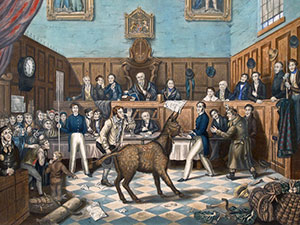January 6
Published in On this Day listing- 1821 William Putnam McCabe (c. 46), a United Irishman noted for his ability to elude arrest by his powers of disguise and mimicry, who later settled in France and founded a cotton factory, died.
- 06/1834

Above: The Trial of Bill Burns—a painting showing Richard Martin with a donkey in an astonished courtroom, leading to the world’s first known conviction for animal cruelty.
Richard Martin (79), landowner and politician, died. Residing in Dangan House, some four miles upstream on the Corrib from Galway city, Martin, who sat in both the Irish House of Commons and the British House of Commons, was the owner of the largest estate in Ireland, some 200,000 acres. Renowned for his quick wit and humorous speeches, he was a noted duellist who survived over 100 duels with sword and pistol, an avid traveller who toured Europe and the Americas, and in politics a dedicated reformist who opposed slavery and supported Catholic Emancipation. On first-name terms with the great and the good, including the prince of Wales (later King George IV), who gave him the nickname ‘Hairtrigger Dick’, Henry Flood, Henry Grattan and Daniel O’Connell, he also knew a youthful Wolfe Tone, whom he employed to tutor his two younger half-brothers for an extended period in 1783 when Tone, coincidentally, was suspended from Trinity College for duelling. Though Tone at that time was obsessed with amateur dramatics and with Martin’s attractive wife, Eliza, with whom he appeared in Galway’s Kirwin Lane theatre in the comic drama All the World’s a Stage as a character who, ironically enough, attempts in vain to commit suicide, his employer may well have nurtured his political thinking. Today, Martin is best remembered for his private member’s bill ‘to prevent the cruel and improper treatment of cattle’, which became law in 1822 as ‘Martin’s Act’ and earned him the popular name ‘Humanity Dick’. He was also a co-founder of the Royal Society for the Protection of Animals (1824).
- 1980 The killing of three full-time UDR soldiers—Robert Smith (18), James Cochrane (21) and Richard Wilson (21)—in an IRA bomb attack near Castlewellan, Co. Down, brought the death-toll of the Troubles to 2,000.
- 1919 Theodore Roosevelt (60), 26th US president (1901–9), whose face is depicted on Mount Rushmore alongside Washington, Jefferson and Lincoln, died.
- 1964 Pope Paul VI completed a three-day visit to the Holy Land, the first pope to visit there since Christianity began and the first to leave Italy in over 150 years.
- 1839 ‘The Night of the Big Wind’. A violent storm, perhaps the worst of the century, with wind speeds averaging 80 miles an hour and gusts possibly over 100 miles an hour, caused widespread damage across the country.
- 1818The General Post Office (GPO) on Sackville (O’Connell) Street, Dublin, designed by Francis Johnston, opened to the public.
- 1066 Harold II (Godwinson) was crowned king of England in succession to Edward the Confessor. He was the last Anglo-Saxon king of England.
- 1973 Dr Patrick Hillery was appointed Irish commissioner in the EEC, with the portfolio for social affairs.
















